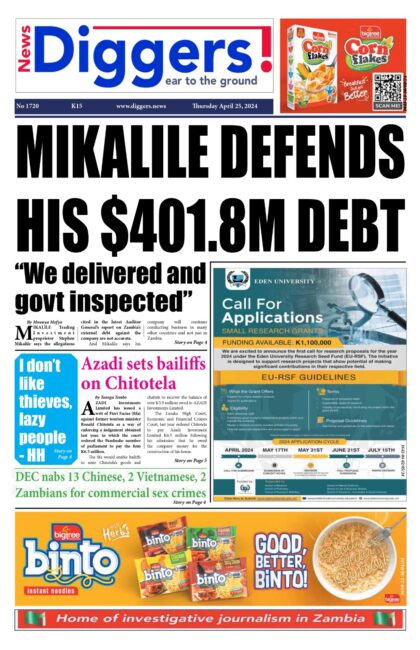Government still owes Konkola Copper Mines (KCM) Plc, among four other mining companies, a total of K2.8 billion in Value Addition Tax (VAT) refunds, Minister of Finance Dr Bwalya Ng’andu has revealed.
On Thursday, Mufilira PF member of parliament Dr Evans Chibanda asked Dr Ng’andu in Parliament how much money in VAT refunds was owed to Mopani Copper Mines Plc; Kalumbila Minerals Limited (KML); Konkola Copper Mines (KCM) Plc; manufacturing companies; Kansanshi Mining Company; Lumwana Mining Company (LMC); what government’s total internal debt was and whether the amount owed in VAT refunds was part of the government’s internal debt as at June 30, 2019.
In response, Dr Ng’andu revealed that government owed the named mining companies K2.8 billion.
“I wish to inform the August House that the Value Added Tax that is owed by June 30, 2019, are as follows to the named mining companies: K2,834,554,106; manufacturing companies: K236,601,429; other business entities K1,719,250,213; diplomats K1,202,543. The grand total of all these categories are K4,791,608,292. This August House may wish to note that mentioning the liabilities of specific mining companies as required by the question will result in a breach of confidentiality clauses as outlined in the certain pieces of legislation,” Dr Ng’andu revealed.
“Total internal government debt as at June 30, 2019, is broken down as follows: Treasury Bills: K20.1 billion; government bonds: K40.2 billion; VAT arrears K4.8 billion and domestic arrears K20.2 billion. This House may wish to know that the amounts owed in VAT refunds as at June 30, 2019, were part of the government’s internal debt.”
He explained that the increase in arrears was mainly attributed to VAT Rule 18.
“I will give a background why the arrears have reached the levels it has reached. In 2012, there was an amendment to (VAT) Rule 18 and this amendment put in place more stringent measures that these documents are required to verify whether a claim is true or not true. As a result of that, a number of documents, which previously were not required, were asked for. As a result, the process of actually verifying, which payments were valued, which payments were not, took a long time and within that period, the arrears accumulated to the levels that they have reached,” he explained.
“But this Rule was later amended back to where it was; as a consequence of which after 2015, the documents that are required now are less stringent and include certificate of shipment, transit documents, that have not been issued by the country through which the goods transited during exports. So, to that extent, we are not accumulating arrears in the same way that we did when we were applying version of Rule 18.”
He added that government had put in place stringent measures to dismantle the huge arrears.
“Now, in terms of what we are doing with these arrears, a number of things, one: we are engaging each entity that is involved here, particularly, the ones outstanding are large so that we can come to an agreement regarding the schedule of repayment. And once we have agreed that, we formalize that, then we can start paying in accordance with the agreement that we reach with the various entities,” he said.
“But, I also mentioned in my (2020) budget address that going forward, particularly, we respect the mining companies; we will no longer be requiring to collect VAT on machinery and equipment that has been imported because we have now zero-rated this. So, a larger component of that gives rise to VAT refunds will not apply any more; with that, we will hope that the rate at which VAT refunds accumulate reduces substantially.”
But Dr Ng’andu stressed that VAT should not be used as part of government’s working capital.
“It is important to now make this point clear that, VAT should not be used as part of government’s working capital because it is not. It is not part of government working capital. It is refundable once you work out the difference between the input VAT and as opposed to the output. So, if at all it used as working capital, it is a ‘by the way’…that is not the objective or purpose of it,” stressed Dr Ng’andu.
“I think that aspect is important and I think going forward as we work out the modality of extinguishing all the loans, we are looking at the VAT refunds, the TBs, the bonds arrears as part of this quantum of debt, which means a comprehensive approach to it. We will look at all the debt and comprehensively try to deal with the debt. I understand that it is a fairly a large quantum you are talking about when you put it together. But the strategy is to deal with the debt not as small components, but as a comprehensive approach so that at the end of it, we would have dealt with the problem more comprehensively and to the satisfaction of the subscribers, to the bonds and TBs.”
The K2.8 billion is part of a total of K4.8 billion in VAT refunds of what government still owes to selected companies in the country, according to Dr Ng’andu.











